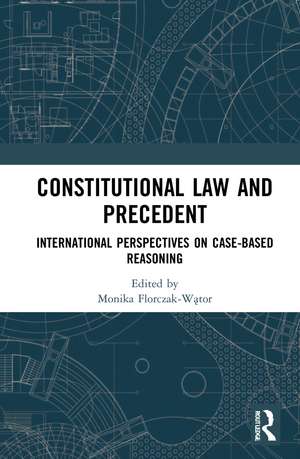Constitutional Law and Precedent: International Perspectives on Case-Based Reasoning
Editat de Monika Florczak-Wątoren Limba Engleză Paperback – 25 sep 2023
Argumentation based on judicial authority is now fundamental to the resolution of constitutional disputes. At the same time, it is the most common form of reasoning used by courts. This volume shows not only the strengths and weaknesses of such argumentation, but also its serious methodological shortcomings. The book is comparative in nature, with individual chapters examining similar problems that different courts have resolved in different ways. The research covers three types of courts; namely the civil law constitutional courts of Germany, Italy, Poland, Lithuania, and Hungary; the common law supreme courts of the United States, Canada, and Australia; and the European international courts represented by the European Court of Human Rights and the Court of Justice of the European Union. The authors are distinguished scholars from various countries who specialise in constitutional justice issues.
This book will be of interest to legal theorists and practitioners, and will be especially insightful for constitutional court judges.
The Open Access version of this book, available at www.taylorfrancis.com, has been made available under a Creative Commons Attribution-Non Commercial-No Derivatives 4.0 license.
| Toate formatele și edițiile | Preț | Express |
|---|---|---|
| Paperback (1) | 259.98 lei 6-8 săpt. | |
| Taylor & Francis – 25 sep 2023 | 259.98 lei 6-8 săpt. | |
| Hardback (1) | 934.94 lei 3-5 săpt. | +20.62 lei 6-10 zile |
| Taylor & Francis – 31 mar 2022 | 934.94 lei 3-5 săpt. | +20.62 lei 6-10 zile |
Preț: 259.98 lei
Preț vechi: 326.49 lei
-20% Nou
Puncte Express: 390
Preț estimativ în valută:
49.75€ • 52.18$ • 41.41£
49.75€ • 52.18$ • 41.41£
Carte tipărită la comandă
Livrare economică 02-16 aprilie
Preluare comenzi: 021 569.72.76
Specificații
ISBN-13: 9781032205878
ISBN-10: 1032205873
Pagini: 292
Dimensiuni: 156 x 234 mm
Greutate: 0.45 kg
Ediția:1
Editura: Taylor & Francis
Colecția Routledge
Locul publicării:Oxford, United Kingdom
ISBN-10: 1032205873
Pagini: 292
Dimensiuni: 156 x 234 mm
Greutate: 0.45 kg
Ediția:1
Editura: Taylor & Francis
Colecția Routledge
Locul publicării:Oxford, United Kingdom
Public țintă
PostgraduateCuprins
Introduction: On the Methodology of the Research on Case-Based Reasoning in Constitutional Adjudication
PART I: Supreme Courts in Common Law System
Chapter 1: United States of America
The Supreme Court of the United States: legitimate law-maker and constitutional interpreter
Chapter 2: Canada
The Supreme Court of Canada: The Road to Authority, Legitimacy, and Independence
Chapter 3: Australia
Precedents and Case-Based Reasoning in the Case-Law of The High Court of Australia
PART II: Constitutional Courts in Civil Law System
Chapter 4: Germany
The Role of Precedents and Case-Based Reasoning in the German Federal Constitutional Court
Chapter 5: Hungary
Precedents and Case-Based Reasoning in the Case-Law of the Hungarian Constitutional Court
Chapter 6: Italy
Precedents and Case-Based Reasoning in the Adjudications of the Italian Constitutional Court
Chapter 7: Latvia
Precedents and Case-Based Reasoning in Constitutional Adjudication: The Republic of Latvia
Chapter 8: Poland
Precedents and Case-Based Reasoning in the Case-Law of the Constitutional Tribunal of the Republic of Poland
Chapter 9: Romania
The Role of Precedents and Case-Based Reasoning in the Case-Law of the Romanian Constitutional Court
PART III: International Courts in European Law System
Chapter 10: Court of Justice of the European Union
Court of Justice of the European Union – ‘Stone-by-Stone’ Case-Based Reasoning
Chapter 11: European Court of Human Rights
Precedent in the System of the European Convention on Human Rights
PART IV: Comparative Analysis
Chapter 12: Conclusion
The Role of Case-Based Reasoning in Constitutional Adjudication: A Comparative Study
Index
PART I: Supreme Courts in Common Law System
Chapter 1: United States of America
The Supreme Court of the United States: legitimate law-maker and constitutional interpreter
Chapter 2: Canada
The Supreme Court of Canada: The Road to Authority, Legitimacy, and Independence
Chapter 3: Australia
Precedents and Case-Based Reasoning in the Case-Law of The High Court of Australia
PART II: Constitutional Courts in Civil Law System
Chapter 4: Germany
The Role of Precedents and Case-Based Reasoning in the German Federal Constitutional Court
Chapter 5: Hungary
Precedents and Case-Based Reasoning in the Case-Law of the Hungarian Constitutional Court
Chapter 6: Italy
Precedents and Case-Based Reasoning in the Adjudications of the Italian Constitutional Court
Chapter 7: Latvia
Precedents and Case-Based Reasoning in Constitutional Adjudication: The Republic of Latvia
Chapter 8: Poland
Precedents and Case-Based Reasoning in the Case-Law of the Constitutional Tribunal of the Republic of Poland
Chapter 9: Romania
The Role of Precedents and Case-Based Reasoning in the Case-Law of the Romanian Constitutional Court
PART III: International Courts in European Law System
Chapter 10: Court of Justice of the European Union
Court of Justice of the European Union – ‘Stone-by-Stone’ Case-Based Reasoning
Chapter 11: European Court of Human Rights
Precedent in the System of the European Convention on Human Rights
PART IV: Comparative Analysis
Chapter 12: Conclusion
The Role of Case-Based Reasoning in Constitutional Adjudication: A Comparative Study
Index
Notă biografică
Monika Florczak-Wątor is a full professor at the Department of Constitutional Law of the Jagiellonian University in Krakow, a director of the Center for Interdisciplinary Constitutional Studies of the Jagiellonian University and director of the Interdisciplinary Program 'Society of the Future' at the Doctoral School in the Social Sciences of the Jagiellonian University, Poland.
Descriere
This collection examines case-based reasoning in constitutional adjudication, that is, how courts decide on constitutional cases by referring to their own prior case law and the case law of other national, foreign and international courts.
